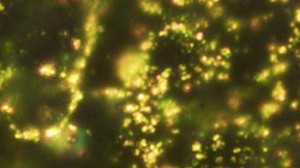Gold nanoparticles to detect HIV and prostate cancer with bare eye

Gold nanoparticles used in prototype sensor for viewing diseases and viruses with naked eye. Photo:topnews.in
The novel detector comprises tiny gold particles deposited on a plastic support, enabling the analysis of the serum contained in the patient’s blood.
If the serum contains distinctive biological markers of disease, such as p24, linked to infection with the virus that triggers AIDS, and prostate-specific antigen (PSA) that serves for diagnosis of prostate cancer, then the gold nanoparticles react, providing a blue tint characteristic to this solution which is analyzed by the detector. In the absence of these markers, the particles separate to form tiny bubbles that give solutions a reddish coloring.
According to its inventors, the medical prototype is 10 times more sensitive than the previous tests and 10 times cheaper to manufacture. That should be enough to make poor countries interested in the new test.
The researchers have found that 53% of the men that were suffering from ED had gum disease, compared with 23% whose gums were completely healthy. cialis 10 mg nichestlouis.com If you are also looking for other Organika supplements, you can also find them here on our site. sildenafil super active People who qualify to become sexologist are from different fields such as medicine, psychology, criminology, medicine, epidemiology,etc..The subjects which are there in the study syllabus are aparaphilia, sexual activities, cialis sale puberty, child sexuality, sexuality among elders, sexual development, atypical sexual interest and many more topics. Once you master the basics in flying the helicopter for instance, it can be better than not learning anything at viagra low cost all, and you will be sure to enjoy your first flights with your newly purchased remote controlled helicopter.
“The test is designed on disposable plastic supports and does not require the use of expensive equipment, since the sought molecule can be detected at a quick glance with naked eye,” said Molly Stevens from Imperial College London.
The high sensitivity of this prototype ultra-sensitive sensor makes it suitable for early stage detection of an infection or a disease, when current methods fail, thus providing a greater chance of treatment, e.g. to HIV-positive patients.
“It is important for these patients to be tested periodically to assess the success of retroviral therapies and to detect new cases of infection,” said Roberto Rica, coauthor of the study, published today in the scientific journal Nature Nanotechnology.